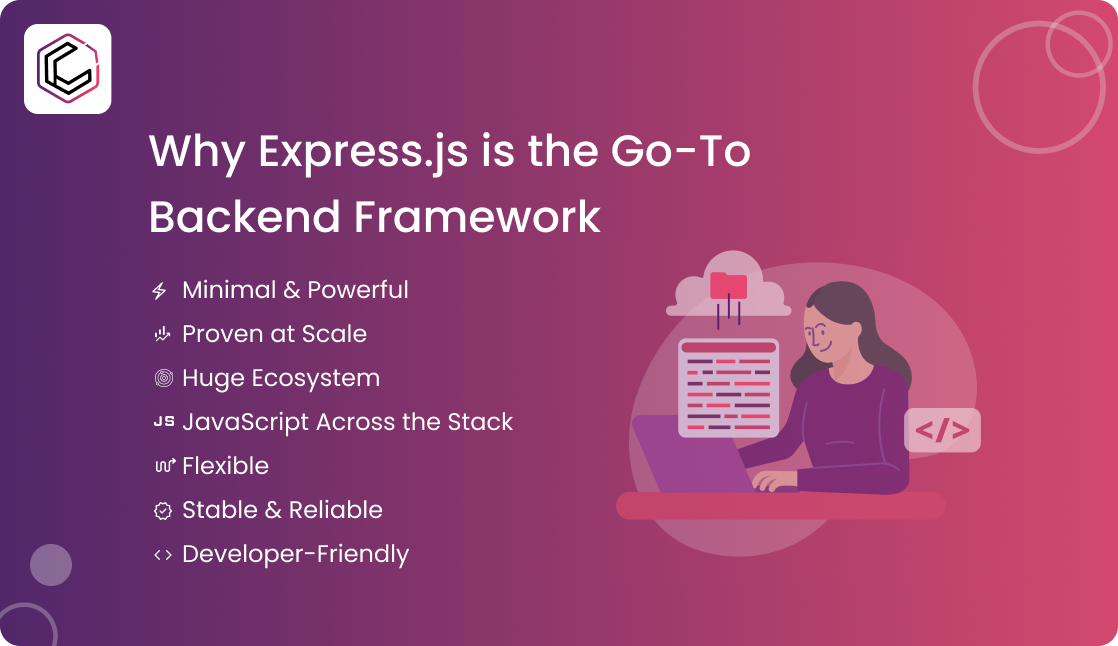When it comes to building a backend for your web application, the choices can feel endless. From shiny new frameworks to enterprise-level stacks, everyone promises performance, scalability, and flexibility.
But for more than a decade, one framework has quietly (and consistently) remained the favorite for developers worldwide: Express.js.
It’s the framework behind countless startups, high-traffic applications, and even Fortune 500 companies. But why does Express still dominate when newer frameworks keep entering the scene? Let’s break it down.
1. Minimal Yet Powerful
Express is famously minimal by design. Instead of locking you into strict rules or heavy structures, it gives you just the essentials to get started.
Think of it as a sturdy base, like the foundation of a building. You can customize and expand it however you like, without carrying unnecessary weight.
This lightweight nature makes it easier to maintain and keeps your backend clean and reliable.
2. Proven at Scale
This isn’t a “works great for small projects” kind of framework. Express has powered some of the world’s largest platforms, including Netflix, Uber, and PayPal, handling massive traffic and complex systems without breaking a sweat.
That real-world track record gives teams confidence. They know Express isn’t just fast on paper and it’s been tested and proven in the most demanding environments.
3. An Ecosystem That Works for You
One of Express’s biggest strengths is its huge ecosystem of middleware.
Need authentication? Done.
Want to add request logging? Easy.
Looking for API rate limiting? Just plug it in.
You don’t have to reinvent the wheel and the community has already built reliable tools for most use cases, letting you focus on the unique parts of your application.
4. JavaScript From Front to Back
Express uses JavaScript, the same language as your frontend.
This means:
- Your frontend and backend can share code for things like validation.
- Developers can work across the stack without switching languages.
- The learning curve for frontend devs stepping into backend work is much lower.
When your team speaks the same language, development becomes faster and more error-free.
5. Flexible for Any Project
While Express is best known for powering REST APIs, its use cases go far beyond that. You can:
- Serve static files and websites
- Handle server-side rendering
- Act as a gateway for microservices
- Build real-time apps with WebSockets (via Socket.io)
Whether you’re building a quick MVP or a large-scale platform, Express can adapt to your needs.
6. Stability That Lasts
Some frameworks fade away after a couple of years. Others change so often that maintaining a project becomes a nightmare.
Express has found the sweet spot and it’s actively maintained but doesn’t introduce constant breaking changes.
For long-term projects, this stability is gold. You can upgrade without fear and keep your backend running smoothly for years.
7. Developer-Friendly Experience
Beyond technical features, Express offers something harder to measure: developer happiness.
It’s simple, intuitive, and doesn’t bury you in configuration files. That means less time wrestling with setup and more time building features and the stuff that actually matters to your users.
In a fast-moving tech world, it’s tempting to chase the newest frameworks. But when reliability is the goal, Express.js still delivers.
It’s minimal, battle-tested, flexible, and built on a language your team already knows. Whether you’re a solo developer or part of a big engineering team, Express gives you the confidence to build and scale without unnecessary headaches.
If you need a backend that just works and keeps working, Express.js is still the go-to choice.
